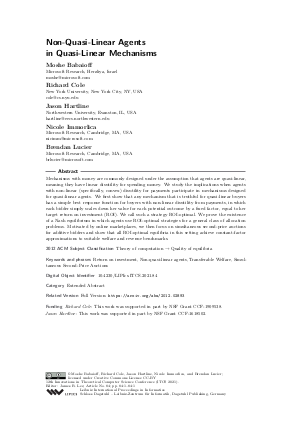Non-Quasi-Linear Agents in Quasi-Linear Mechanisms (Extended Abstract)
Authors Moshe Babaioff, Richard Cole, Jason Hartline, Nicole Immorlica, Brendan Lucier
-
Part of:
Volume:
12th Innovations in Theoretical Computer Science Conference (ITCS 2021)
Part of: Series: Leibniz International Proceedings in Informatics (LIPIcs)
Part of: Conference: Innovations in Theoretical Computer Science Conference (ITCS) - License:
 Creative Commons Attribution 3.0 Unported license
Creative Commons Attribution 3.0 Unported license
- Publication Date: 2021-02-04
File

PDF
LIPIcs.ITCS.2021.84.pdf
- Filesize: 197 kB
- 1 pages
Document Identifiers
Related Versions
-
Full Version: https://arxiv.org/abs/2012.02893.
- Full Version https://arxiv.org/abs/2012.02893
Subject Classification
ACM Subject Classification
- Theory of computation → Quality of equilibria
Keywords
- Return on investment
- Non-quasi-linear agents
- Transferable Welfare
- Simultaneous Second-Price Auctions
Metrics
- Access Statistics
-
Total Accesses (updated on a weekly basis)
0Document
0Metadata
Abstract
Mechanisms with money are commonly designed under the assumption that agents are quasi-linear, meaning they have linear disutility for spending money. We study the implications when agents with non-linear (specifically, convex) disutility for payments participate in mechanisms designed for quasi-linear agents. We first show that any mechanism that is truthful for quasi-linear buyers has a simple best response function for buyers with non-linear disutility from payments, in which each bidder simply scales down her value for each potential outcome by a fixed factor, equal to her target return on investment (ROI). We call such a strategy ROI-optimal. We prove the existence of a Nash equilibrium in which agents use ROI-optimal strategies for a general class of allocation problems. Motivated by online marketplaces, we then focus on simultaneous second-price auctions for additive bidders and show that all ROI-optimal equilibria in this setting achieve constant-factor approximations to suitable welfare and revenue benchmarks.
Cite As Get BibTex
Moshe Babaioff, Richard Cole, Jason Hartline, Nicole Immorlica, and Brendan Lucier. Non-Quasi-Linear Agents in Quasi-Linear Mechanisms (Extended Abstract). In 12th Innovations in Theoretical Computer Science Conference (ITCS 2021). Leibniz International Proceedings in Informatics (LIPIcs), Volume 185, p. 84:1, Schloss Dagstuhl – Leibniz-Zentrum für Informatik (2021)
https://doi.org/10.4230/LIPIcs.ITCS.2021.84
BibTex
@InProceedings{babaioff_et_al:LIPIcs.ITCS.2021.84,
author = {Babaioff, Moshe and Cole, Richard and Hartline, Jason and Immorlica, Nicole and Lucier, Brendan},
title = {{Non-Quasi-Linear Agents in Quasi-Linear Mechanisms}},
booktitle = {12th Innovations in Theoretical Computer Science Conference (ITCS 2021)},
pages = {84:1--84:1},
series = {Leibniz International Proceedings in Informatics (LIPIcs)},
ISBN = {978-3-95977-177-1},
ISSN = {1868-8969},
year = {2021},
volume = {185},
editor = {Lee, James R.},
publisher = {Schloss Dagstuhl -- Leibniz-Zentrum f{\"u}r Informatik},
address = {Dagstuhl, Germany},
URL = {https://drops.dagstuhl.de/entities/document/10.4230/LIPIcs.ITCS.2021.84},
URN = {urn:nbn:de:0030-drops-136230},
doi = {10.4230/LIPIcs.ITCS.2021.84},
annote = {Keywords: Return on investment, Non-quasi-linear agents, Transferable Welfare, Simultaneous Second-Price Auctions}
}
Author Details
Funding
- Cole, Richard: This work was supported in part by NSF Grant CCF-1909538.
- Hartline, Jason: This work was supported in part by NSF Grant CCF-1618502.
